One month ago, on Saturday, October 19, following seven years of growing activity, the Sustainable Favela Network (SFN) hosted its first event open to the general public. The 1st Sustainable Favela Festival: Favela Solutions at the Center brought together 1,100 people from across Greater Rio in Lapa, in the heart of downtown Rio de Janeiro. The event featured 100 activities, all free of charge, led by organizers from over 90 favelas, including artistic interventions, hands-on workshops for adults and children, discussion circles, film screenings, exhibitions, stalls, a fair, and both individual and group healing practices.
The Sustainable Favela Network (SFN) was established in 2017 and has since been expanding its activities in favelas across Greater Rio. Today, it is comprised of 700 members, including community organizers from over 300 favelas and technical allies. The SFN works to implement climate justice by amplifying the potential of favelas as models of sustainable communities.
Held at Fundição Progresso, the 1st Sustainable Favela Festival (SFF) was organized by these favela collectives and allies as a grand meet-up to foster exchanges of socio-environmental solutions between members of the SFN and the general public. The festival featured diverse cultural presentations, hands-on workshops, discussion circles, exhibitions, stalls, a fair, and group healing therapies. Explore the extensive program that unfolded during a full day of activities.
This program reflects work taking place today to build on the ancestral knowledge and technologies emerging from favelas, enabling a rich exchange of experiences during the festival. Over the course of the day, traditionally marginalized communities took center stage, literally and symbolically occupying the city center, presenting solutions, as spaces that devise and implement infrastructure, generate technology, promote research, and advocate for climate justice, socio-environmental education, participatory policymaking, culture and local memory, food sovereignty, collective health, solidarity economy, basic sanitation, energy justice, just transport, and sustainable housing.
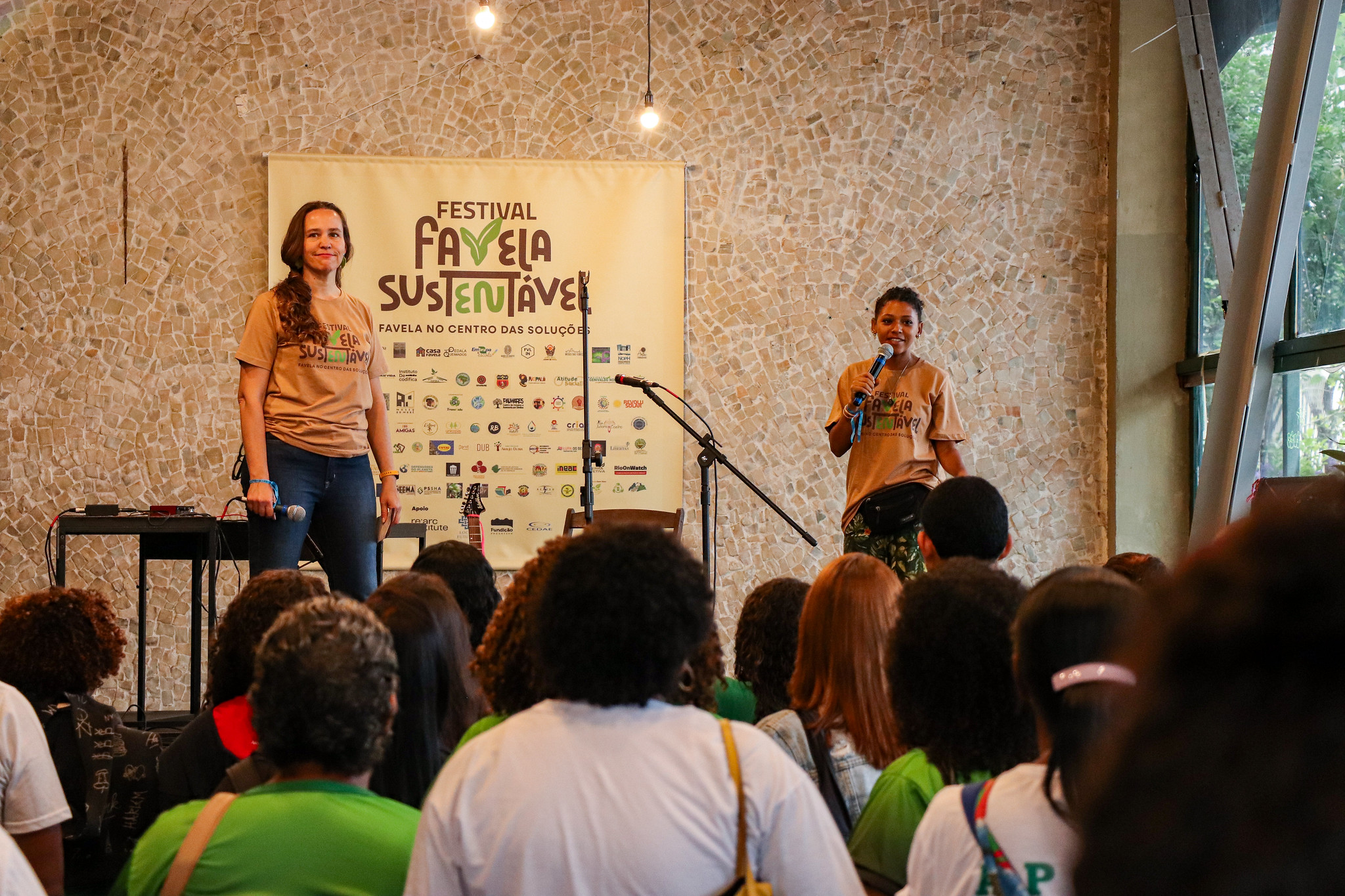
The event was opened by Theresa Williamson, executive director of Catalytic Communities (CatComm)*, the NGO that maintains the Sustainable Favela Network’s managing team, and by Gisele Moura, coordinator of that team, who provided context for the day’s program.
“We are gathered here in this great confluence of solutions. Over 90 favelas are presenting more than 100 solutions throughout the day, through discussion circles, activities, exhibitions, film screenings, and workshops… You’ve received a pamphlet with the program, so feel free to explore and immerse yourself in the diversity that the favelas have to offer. We are here in the city center, occupying this space with our solutions and showing the world what we’ve been discussing in our communities. So, feel free to connect and share. There are so many incredible people here, and we hope you make the most of this space.” — Gisele Moura
Cultural Performances
Throughout the day, the Sustainable Favela Festival’s stage hosted a variety of performances, including Music for Peace (Ponto de Cultura Aos Pés do Santa Marta), the I Was Born In Slavery ballet, inspired by the story of Zumbi dos Palmares (Juliana Coelho Dance Company/Cordovil), Ciranda Soirée featuring poetry and dance (Sarau Ciranda/Rocinha), Interpretive Dance Choir (Vivarte Human Restoration Institute/Rocinha), Sacred Herbs Cultural Presentation and Workshop (Inzo Ia Nzambi Center for Social Integration – CISIN and Ponto de Cultura Preservando Raízes/Nova Iguaçu), Grau Battle (Pedala Queimados/Queimados), Funk and the Environment (#estudeofunk), Afro Dance and Percussion Workshop (Afro Orunmilá/Mineira), and the Afoxé Filhos de Angola Samba Circle (Ofareré Cultural/Tijuquinha).
Pierre Avila, from Music for Peace, explains the origins of the project based in Santa Marta, a favela in Botafogo, a neighborhood in Rio’s South Zone:
“In the past, our community couldn’t hold cultural events because every Friday, the police would invade to suppress culture within the community… So, we created Music for Peace. And today, I’ll kick things off with a really great setlist for you… Our motto is: more music, fewer guns.”
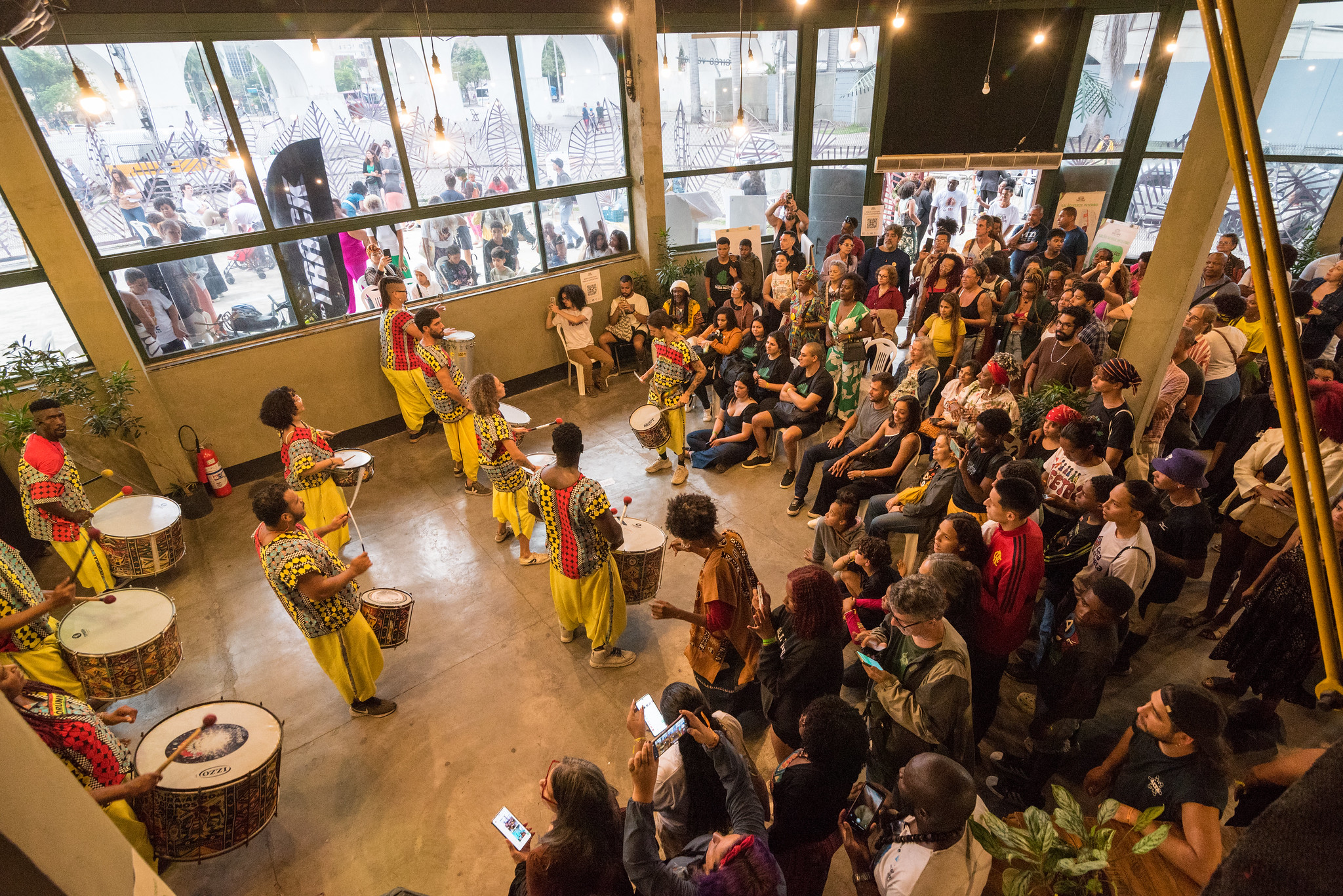
The performances by music group Afro Òrúnmilá and the Afoxé Filhos de Angola samba circle energized the festival, offering the public an opportunity to engage with cultural expressions that reclaim and preserve African and Afro-Brazilian ancestrality. These attractions, rooted in terreiros [sacred places of worship for Afro-Brazilian religions] and Afro-diasporic religious traditions such as Candomblé and Umbanda, created a connection between the artists and the audience. Participants were invited to engage with ancestral practices through music, dance, and rhythms, reinforcing Black identity and the antiracist struggle.
Discussion Circles
One of the festival’s major highlights were the discussion circles. These included: “Black Women Entrepreneurs from Favelas” (FAFERJ, CRIAR, and REAFRO), “Where’s the Water? The Fight for Water Access in Rio de Janeiro” (Popular Network for Monitoring Sanitation and Health), “Just Energy Transition: The Social Role of Solar Energy” (Revolusolar/Babilônia and Chapéu-Mangueira), “Literary Circularity and Ancestrality: Afro Literature as a Bridge to Anti-Racist Education” (Afro Literary Circularity and Ancestrality Collective/Bangu), “Reconnecting with Nature” (RJ Forest Bathing Collective), and “Tuberculosis Discussion Circle” (Transvida Cooperative/Vila Cruzeiro, Complexo da Penha; Vitória Régia Women’s Movement/Campo Grande; Fusion Social Center Association/Jacutinga, Mesquita, Ilha do Governador Women’s Association (AMUIG), and Maria Pimentel Marinho Women’s Movement/Itacolomi, Ilha do Governador).
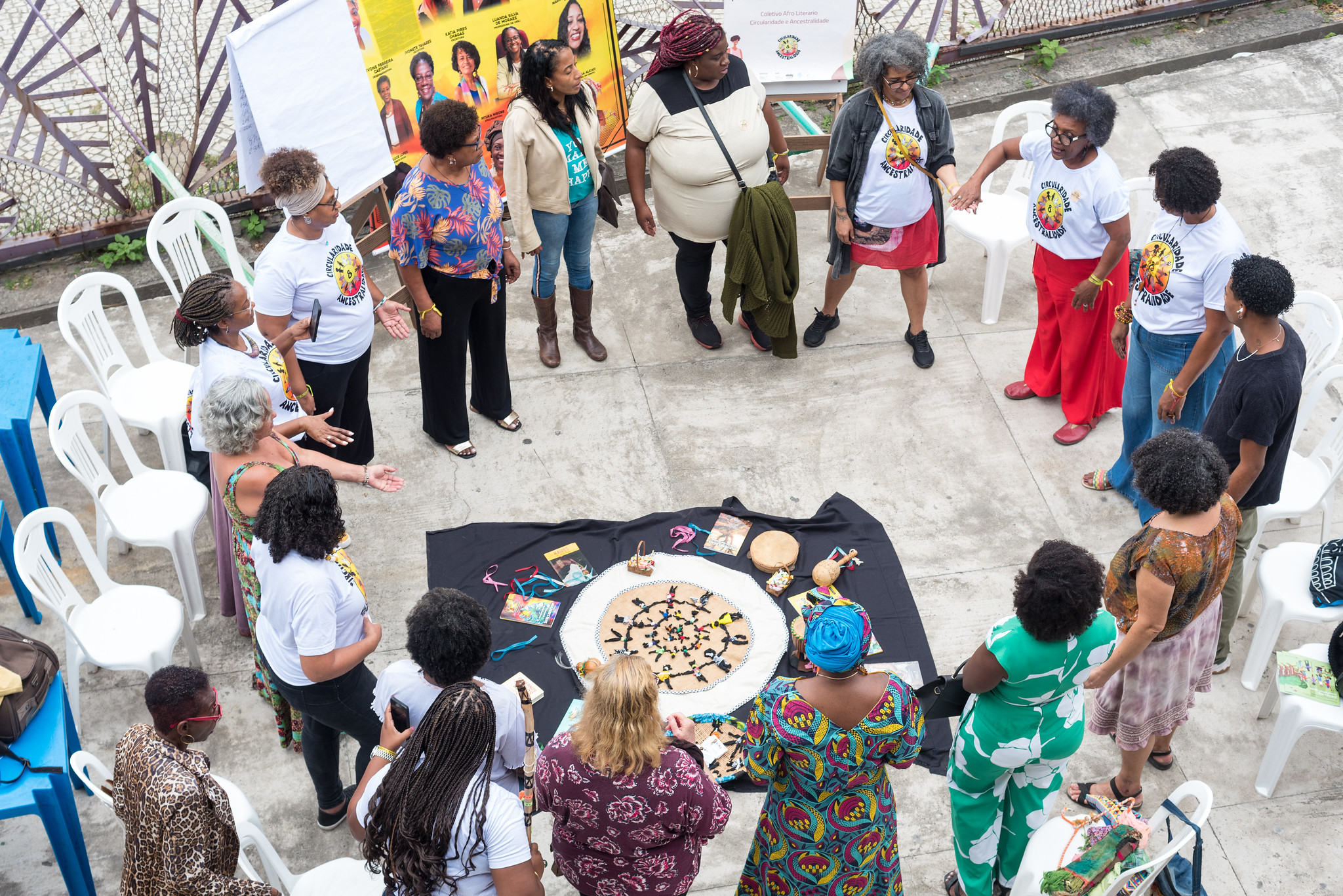
Telma Pires is the president of the West Zone‘s Vitória Régia Women’s Movement and a member of the Healthy Communities Network and the Rio de Janeiro State Tuberculosis Forum. She shared that:
“We are here at this huge event to talk about tuberculosis prevention, which is the best remedy. We also need to have the expertise to show people [the measures of] care, especially since [many] homes in favelas are not [properly] ventilated.”
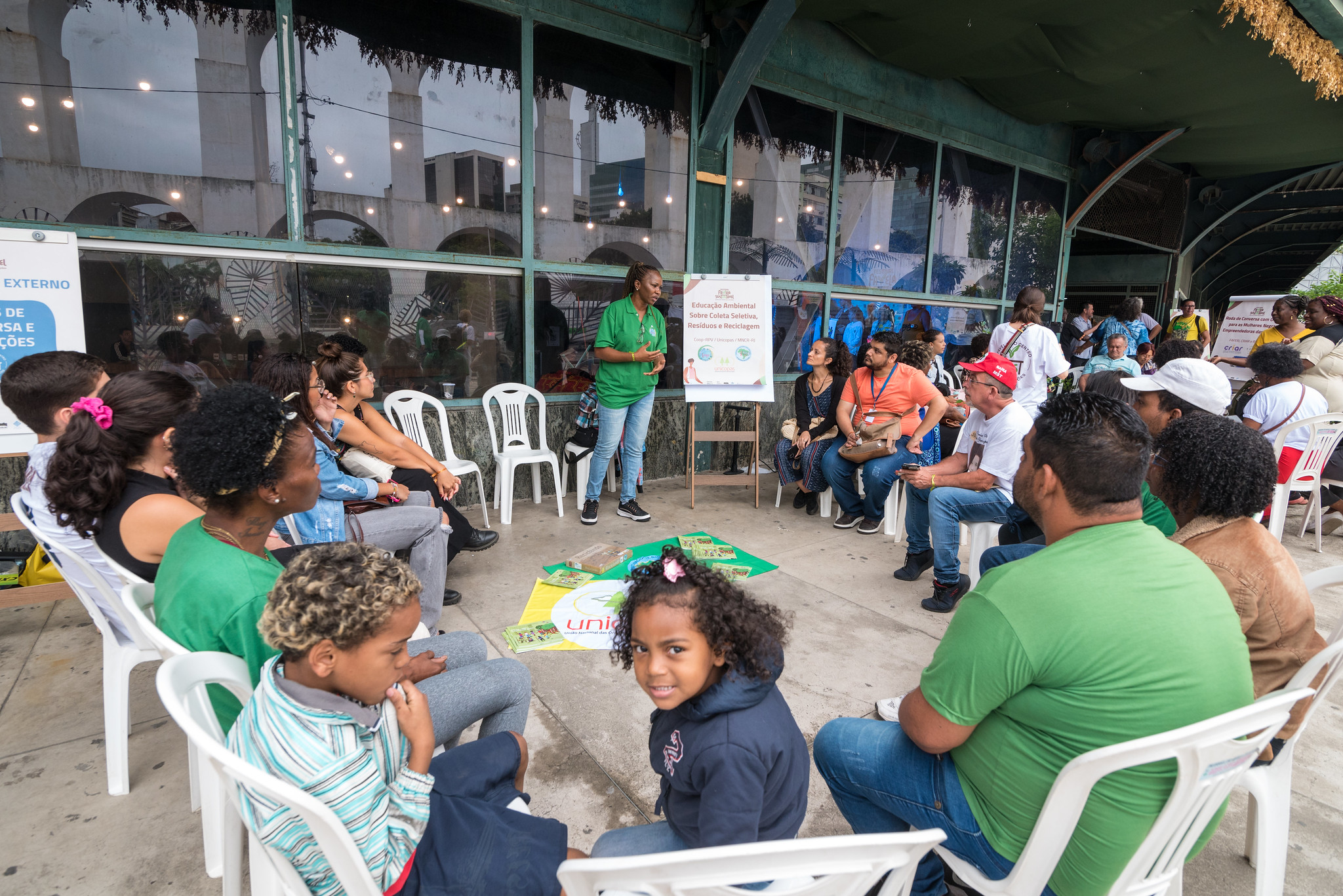
An employee at state water and sewage utility CEDAE and member of the Aldeia Maracanã indigenous collective, Irapuan Tupinambá distributed native seedlings, including achiote, during the discussion circles.
“I am here today at this beautiful event, one that brings together so many fascinating things that are amongst us but we often fail to notice. That is the great importance of events like these—they bring together so much for us to see in a single place. Through this, we begin to truly understand a small piece of our diversity. At CEDAE, we have a program called Replanting Life, which focuses on engaging incarcerated individuals in creating forests… Over the past 21, 22 years, we have, thanks to Father Tupã [the word for God in the Tupi and Guarani indigenous languages], managed to produce around 2 million seedlings annually. We have planted over 4 million seedlings, and what we produce isn’t just part of our tasks or environmental compensation. We produce so that society can carry this sentiment wherever it may go, taking our seedlings to be planted. Today, in particular, as a Tupinambá indigenous person, I feel very happy because one of the most donated species was achiote—the fruit with red seeds that we, indigenous peoples, use to create our art, our designs, and our body paint.” — Irapuan Tupinambá, CEDAE and Aldeia Maracanã
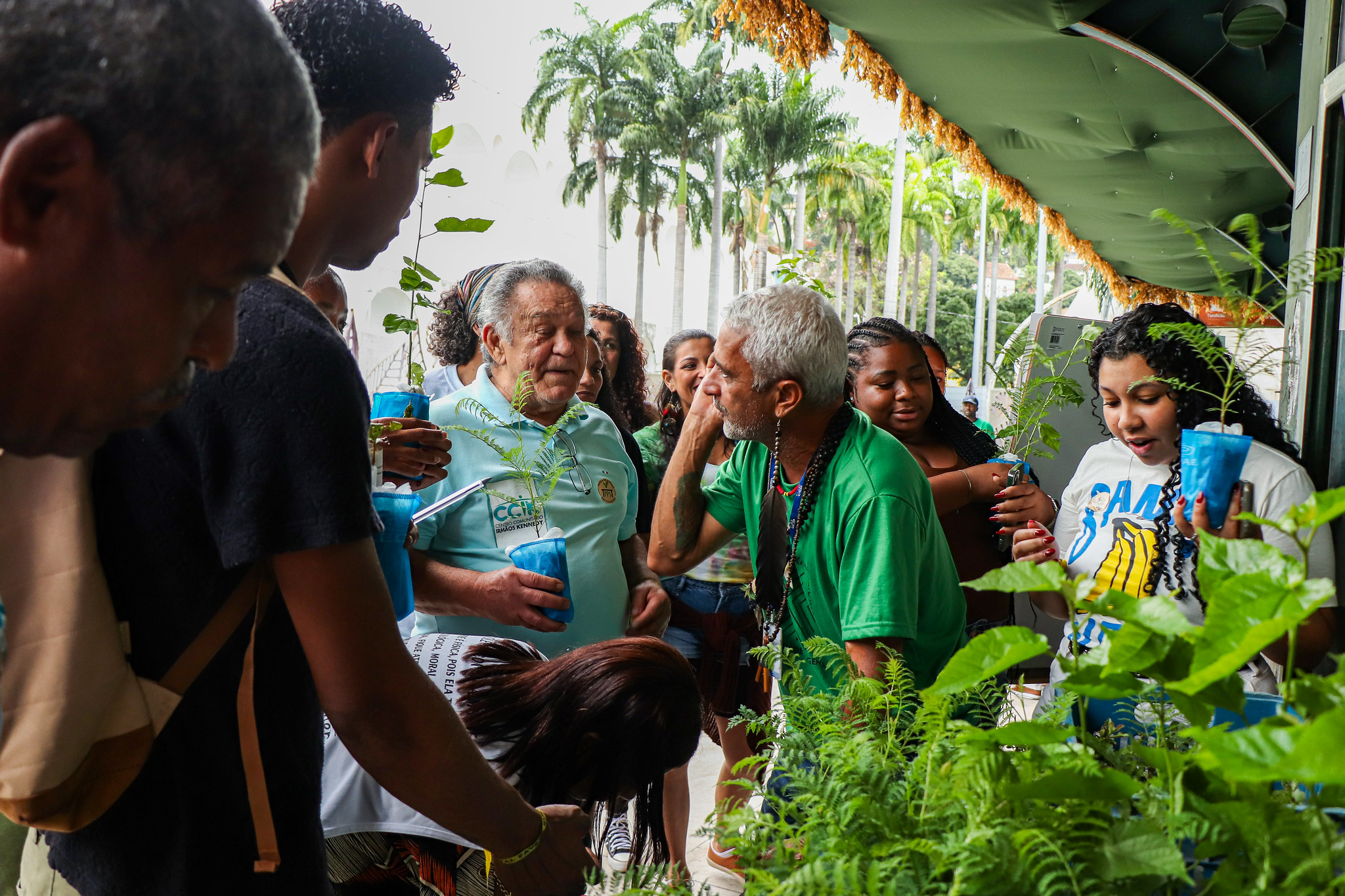
At noon, Vilson Luiz, of the Penha Front, and Alexandre Pessoa, of the Joaquim Venâncio Polytechnic School of Health (EPSJV) at the Oswaldo Cruz Foundation (Fiocruz), shared the history of the Lapa Arches.
A discussion circle that drew a large crowd in the afternoon, “Where’s the Water? The Fight for Water Access in Rio de Janeiro,” was coordinated by the Popular Monitoring Network for Sanitation and Health. The circle gathered over 40 participants to discuss the right to water in the state, amid reports of deteriorating distribution by private water utility Águas do Rio.
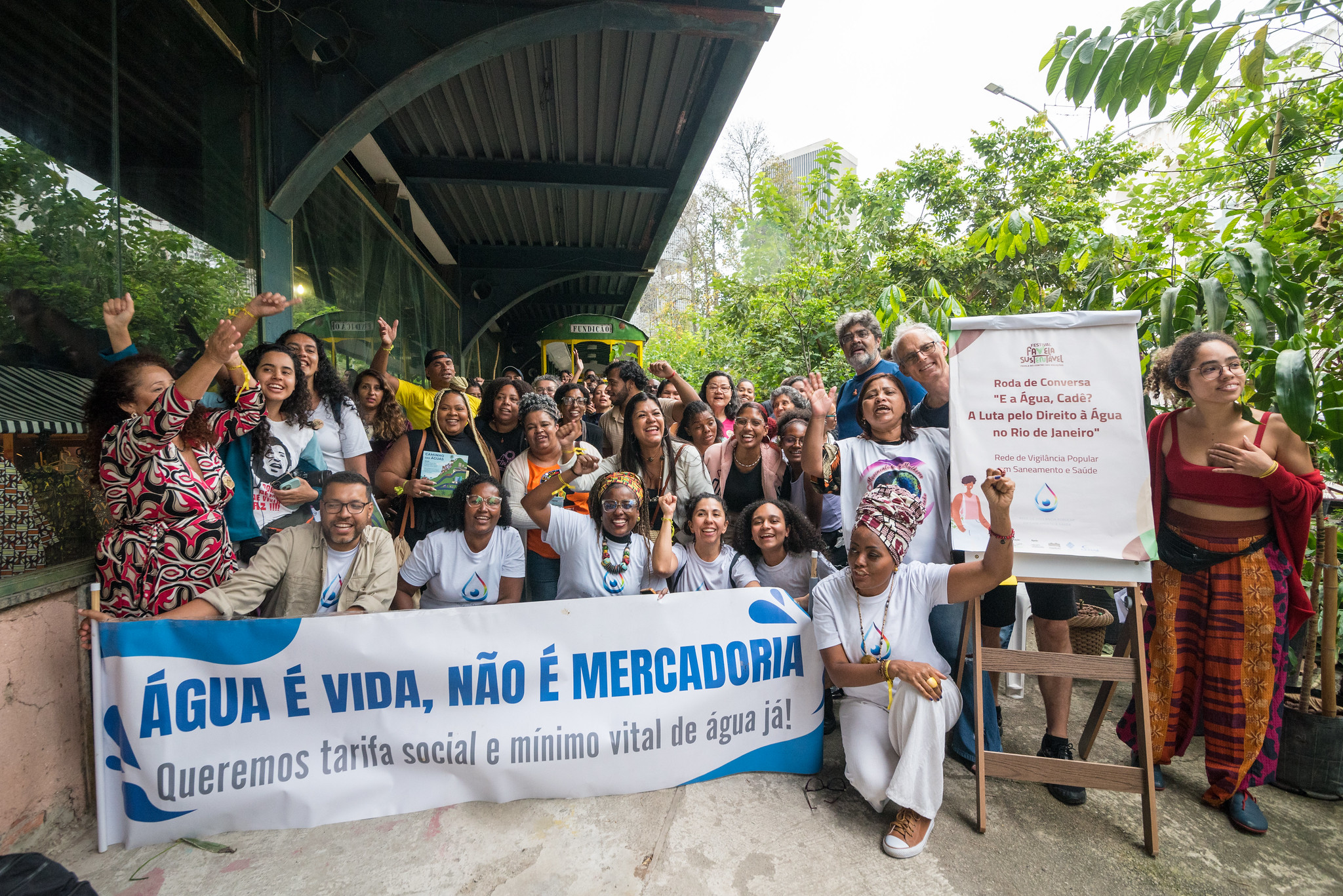
Various favela representatives shared testimonies about the challenges of accessing this basic right. Nill Santos, from the Association of Women With Attitude and Social Commitment (AMAC) in Duque de Caxias, explained that residents are united to prevent any form of extortionate billing.
“[Águas do Rio] said that they came to visit me to ask for permission to enter our community… But I told them that they weren’t going to find a misinformed community because we inform our community through discussion circles… No one was going to sign any document until they went in and spoke with the community, held a meeting with all the residents, so that people could understand the process… Our biggest issue with [Águas do Rio] is the insane charges… [If they have] an answer to that… the AMAC space is open for… them to speak with all the residents.” — Nill Santos
Defenders of the Planet from Guaratiba presented the “Planning Area 5 (AP5) Climate and Environmental Education Game”: a board game where the participants themselves acted as game pieces. Mauro Pereira, a biologist and the NGO’s executive director, explains the importance of participating in the festival for himself and local youth.
“We’re here with 20 youths from West Zone favelas… who are sharing a bit of our reality: a West Zone abandoned by public authorities and, unfortunately, considered a sacrifice zone by the City. The largest polluting corporations—we have a steel mill on the banks of the Sepetiba Bay—have been polluting, increasing greenhouse gas emissions, and severely impacting our region. These young people came together and devised a way to communicate among themselves. They drew inspiration from an old board game with a spinning top but made themselves the protagonists of the game. This game was endorsed by UNICEF as an innovative idea and has been circulating throughout the West Zone to raise awareness and spark conversations about climate change.” — Mauro Pereira
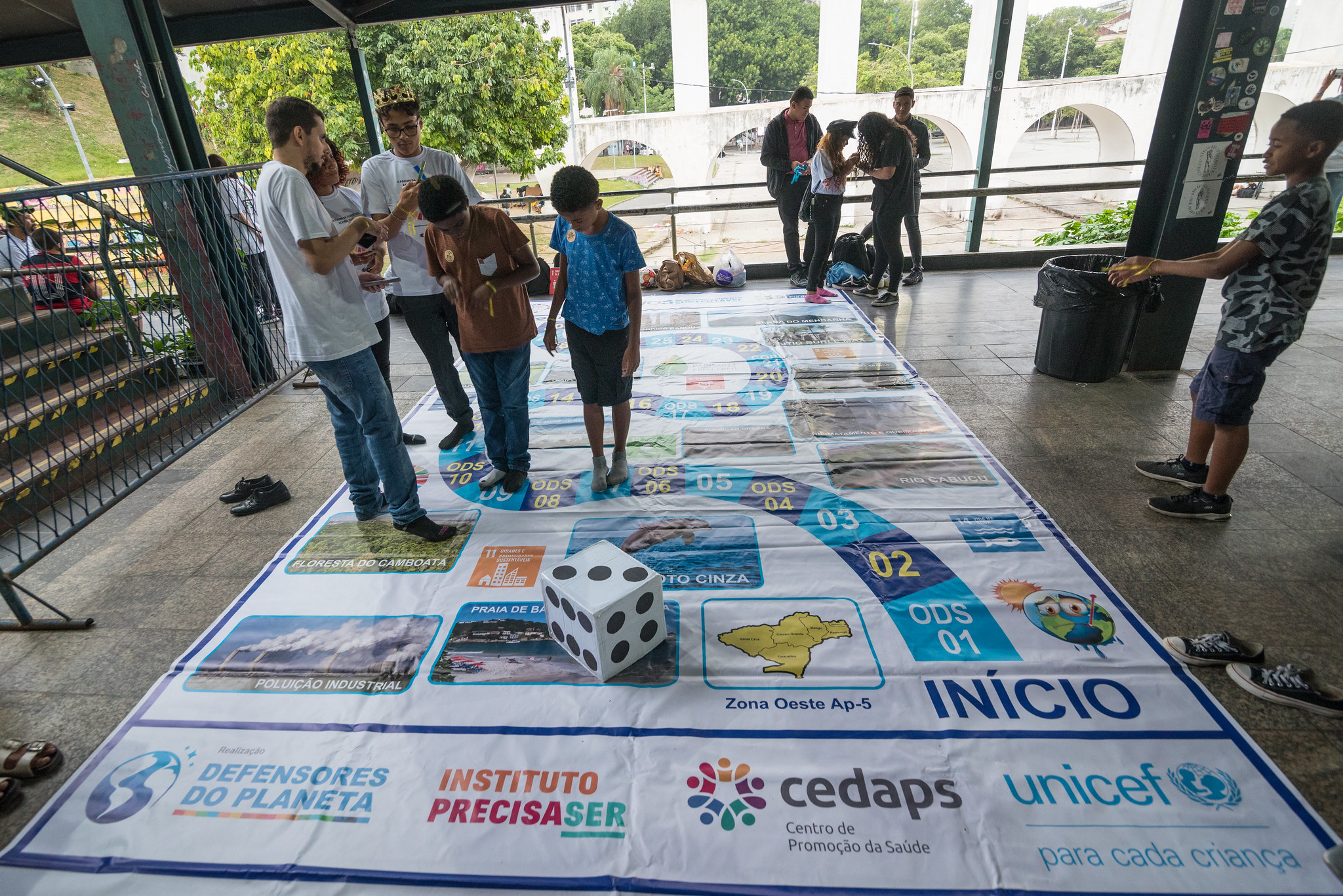
Hands-On Workshops
A lot of creative and sustainable solutions were shared at the hands-on workshops, designed for both adults and children. Some of these workshops included: “Printing with Earth Pigments” (Terra Afetiva/Éden, São João de Meriti), “Grandma’s Recipe Circle” (Solidarity Kitchen/Nova Campinas, Duque de Caxias), “Stencil Art” (Maré Museum), “Herbs and Sensory Workshop” (Salgueiro Herb Growers), “Herb Gardens and Medicinal Plants” (Grassroots and Libertarian Education Collective/Vila Parque da Cidade, Gávea), “Sustainable Knowledge and Aromas” (Green Space Vegetable Garden Project/Niterói), “Toys, Invention, and Childhood: What Can Imagination Do?” (Araújo Dutra Educational Institute/Palmeirinha), “The Importance of Colors in Healthy Eating” (Mulheres da Parada Association/São Gonçalo), “Transformative Waste” (Organic Cycle/Rocinha), “Worm Composting” (Minhocário Arboreum/Guaratiba), “Soil Education” (Embrapa Solos/Chapéu Mangueira), and “How to Conduct Community Research Using Kobotoolbox” (Decodifica Institute).
Ver essa foto no Instagram
During Green Roof Favela’s workshop, “Exchanging Ideas with Green Roof Favela,” Luis Cassiano, from the Arará favela, explained the efficiency of green roofs in reducing home temperatures. He shared the process of assembling the geotextile layer used to fix the plants and highlighted some particularly resilient plant species suitable for green roofs, capable of withstanding this type of installation, high temperatures, and intense sunlight. He invited two volunteers to demonstrate, using their “little houses,” how a green roof works.
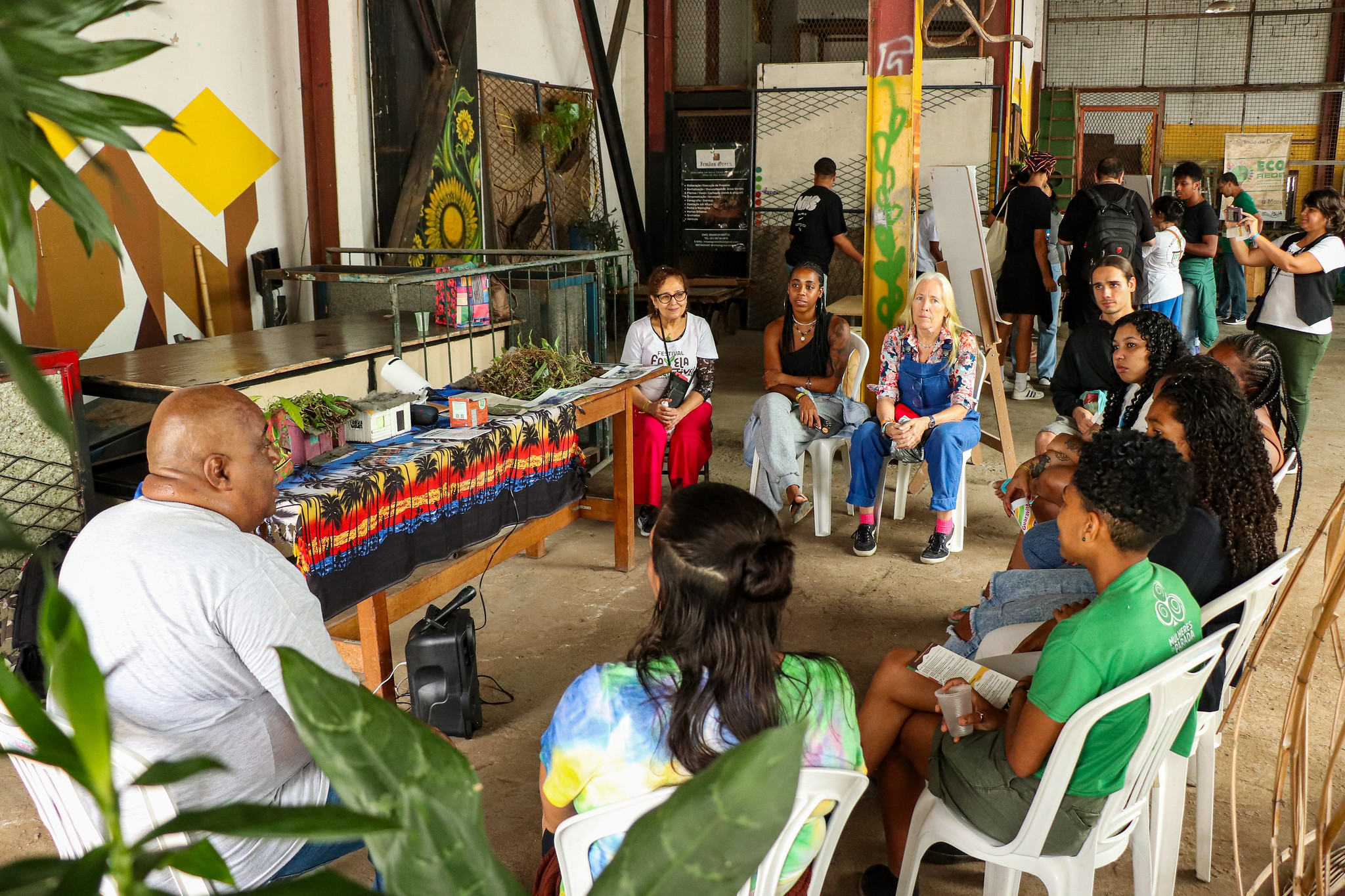
Lidiane Santos, coordinator of the EcoRede project from the community-based institution Alfazendo in City of God, led the “Sustainable CreAtion” workshop and shared her thoughts on the importance of participating in the festival.
“We’ve been a part of the Sustainable Favela Network since 2018. It’s a great achievement for us to be here, united with all of these favela projects, meeting again, gaining strength, witnessing that these projects continue to resist, and sharing what they’ve learned over these years. It’s great to be here inspiring new creations, learning with folks, seeing that some pains are shared by favela territories and that they have also created solutions that are similar and just as creative as ours. So, it’s really a moment of ‘aquilombamento‘ [a coming together in solidarity and mutual strength], of favela residents joining forces to overcome environmental racism.” — Lidiane Santos
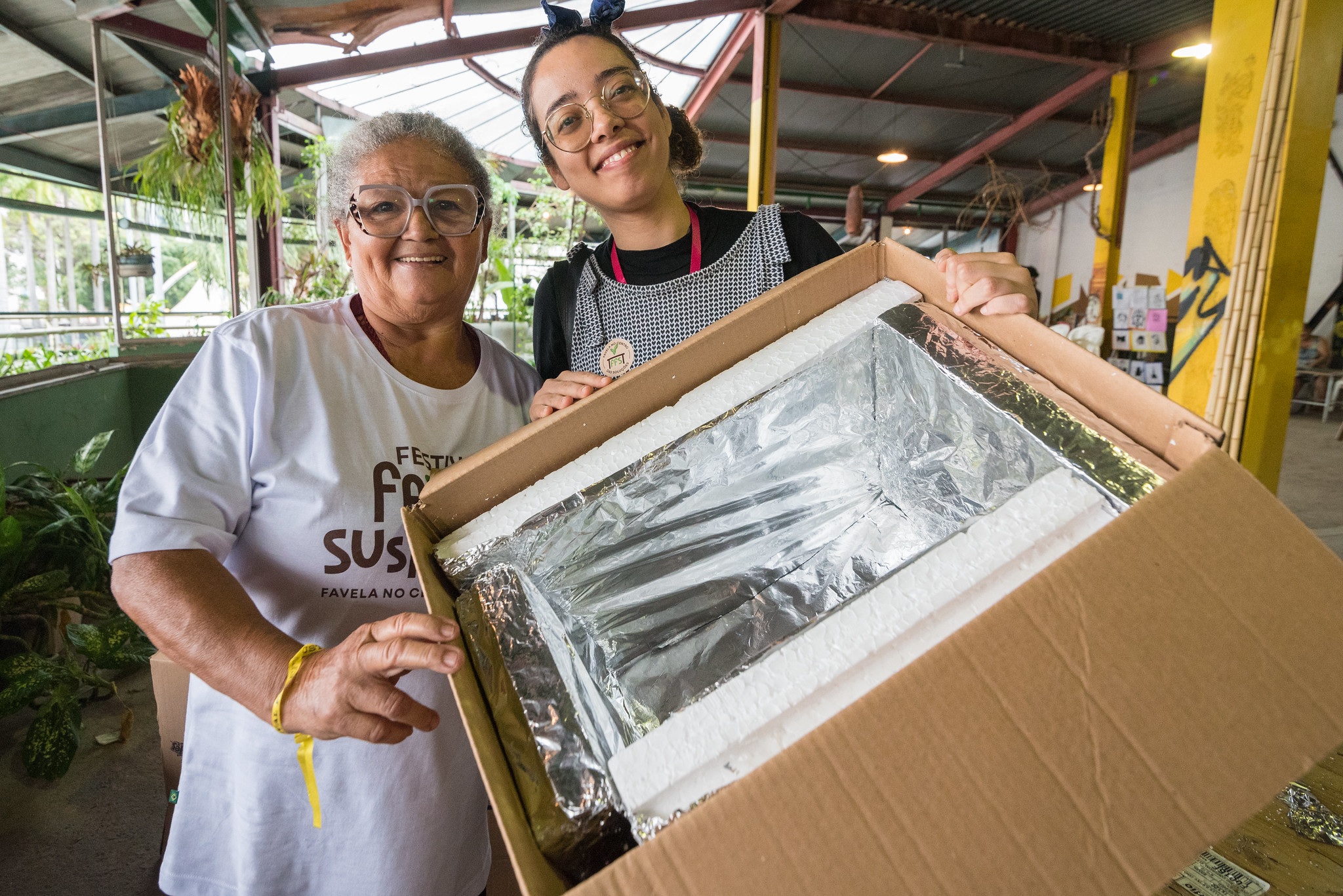
Dona Josefa Maria, an environmental educator and agroecological farmer from Pedra do Sapo, in Complexo do Alemão, led a workshop on solar oven production. She explained the importance of this environmentally sustainable solution, which promotes reuse to mitigate food insecurity among socially vulnerable populations, as the ovens allow food to be cooked using solar energy, eliminating the need for cooking gas.
“People often can’t afford cooking gas. So, they can make an oven like this and use it. Of course, you’ll [need to cook] today to eat tomorrow, as beans take three and a half hours in a pressure cooker, and rice takes three. For other foods, you learn [how to cook them] as you go along the process… I came up with the idea of making a cardboard box and also reusing styrofoam [in the hot sun].” — Josefa Maria
Market Space
The market buzzed with activity throughout the day, with 50 stalls dedicated to exchanging knowledge, selling products, hosting workshops, and presenting exhibitions, showcasing the experiences of various grassroots collectives.
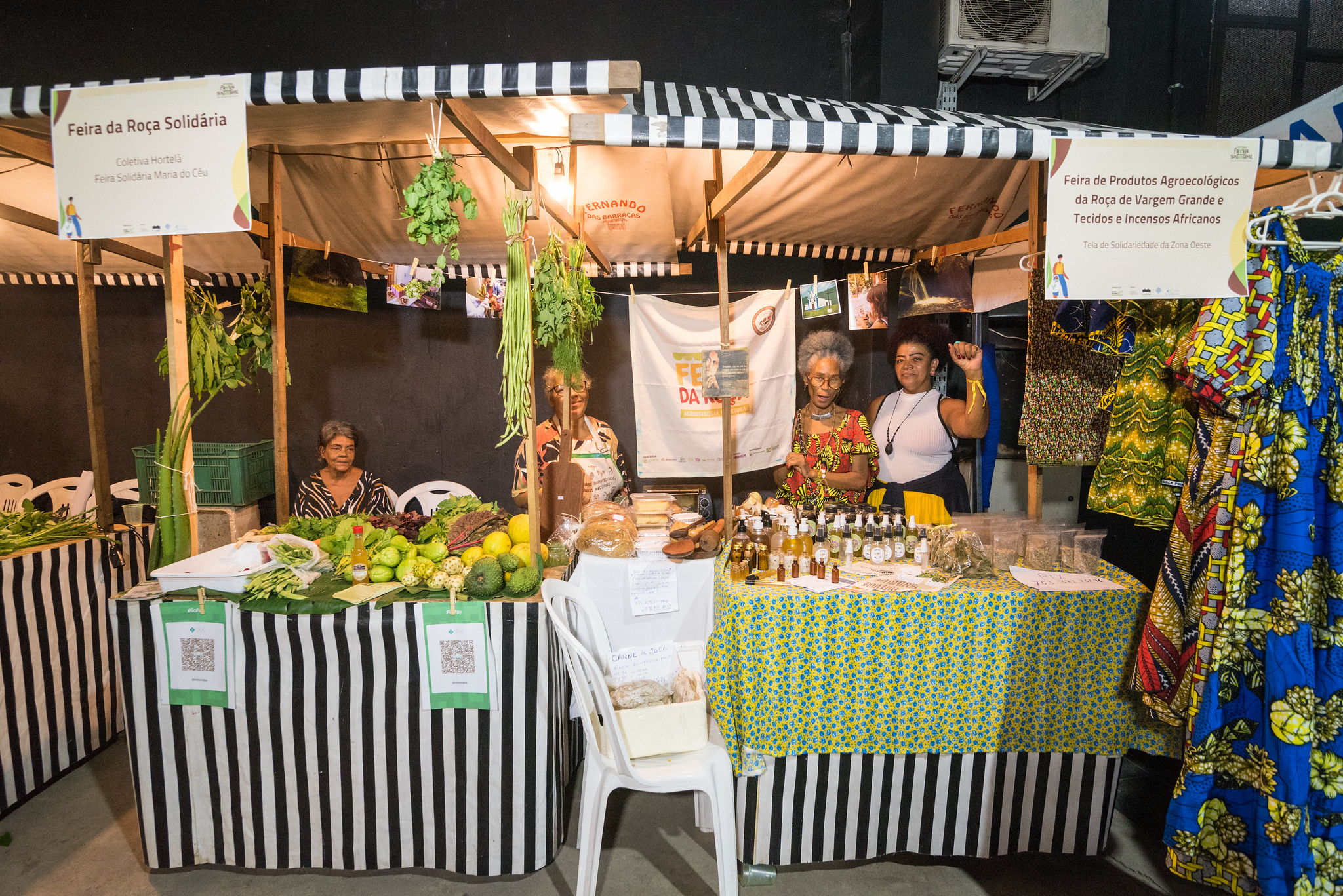
When asked about the importance of participating in the festival, some exhibitors said that, above all, it is a great opportunity to showcase their work. At her bustling stand, “Nete’s Crafts,” Isanete Bernardo da Silva, 66, a resident of Acari, shared a bit about her participation.
“I work with recycling. Anything you can imagine, I recycle. This space is very important because we can showcase our work. Many people weren’t familiar with it… [and] are amazed to see the kind of work I do… It’s very important to see people appreciate my work. I’m really enjoying the market, truly enjoying it.” — Isanete Bernardo da Silva
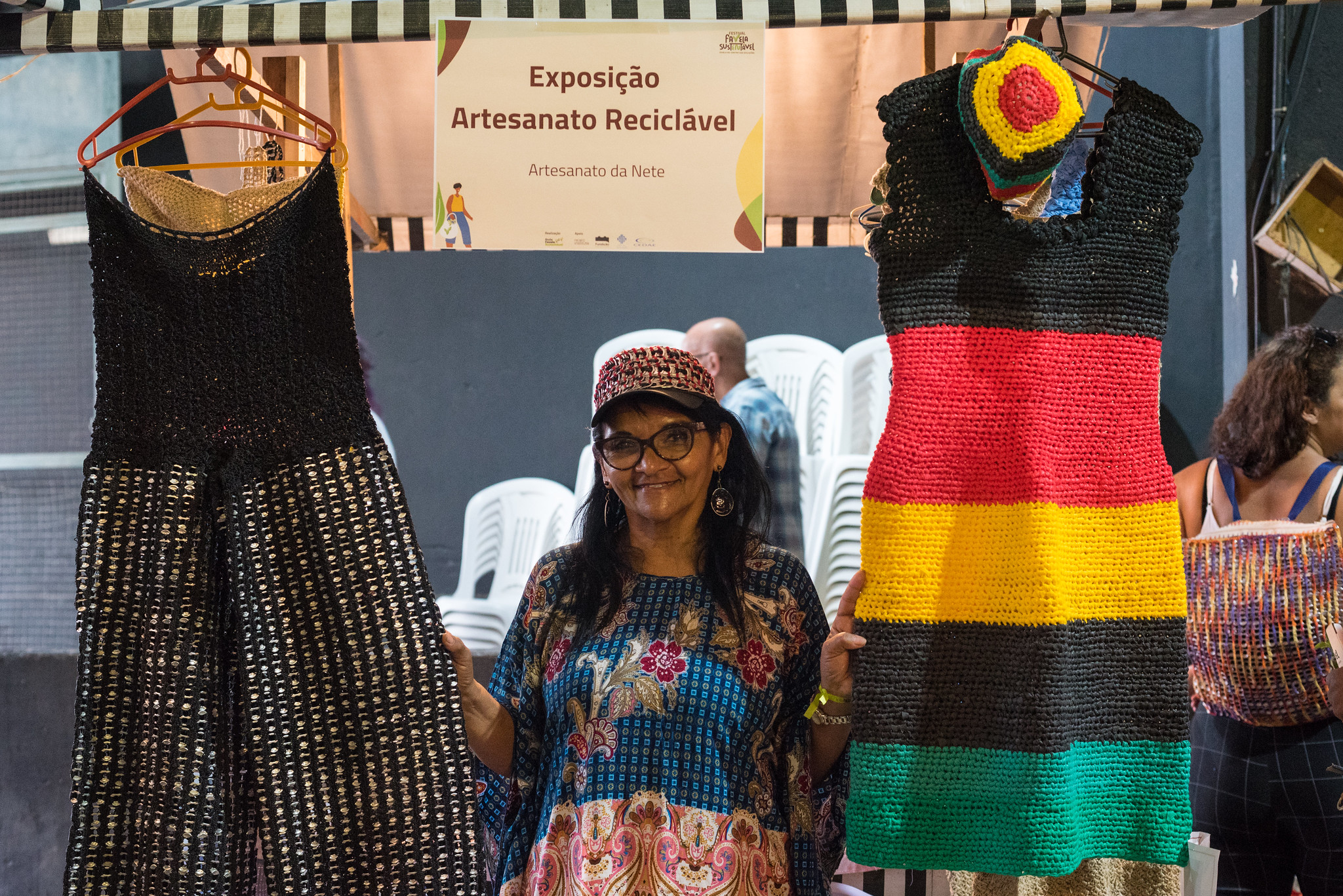
Still at the market, young Black women experienced a touching and empowering moment at the Luminosity of the Ìyálódes [Yoruba word that denotes feminine leadership and great feminine power] stall while speaking with Anailda Charmite. Some of their statements included: “I want to feel more beautiful… I want to be an engineer… I want to be a doctor… I want to study Psychology… We want to become, we will move forward, we are where we want to be.”
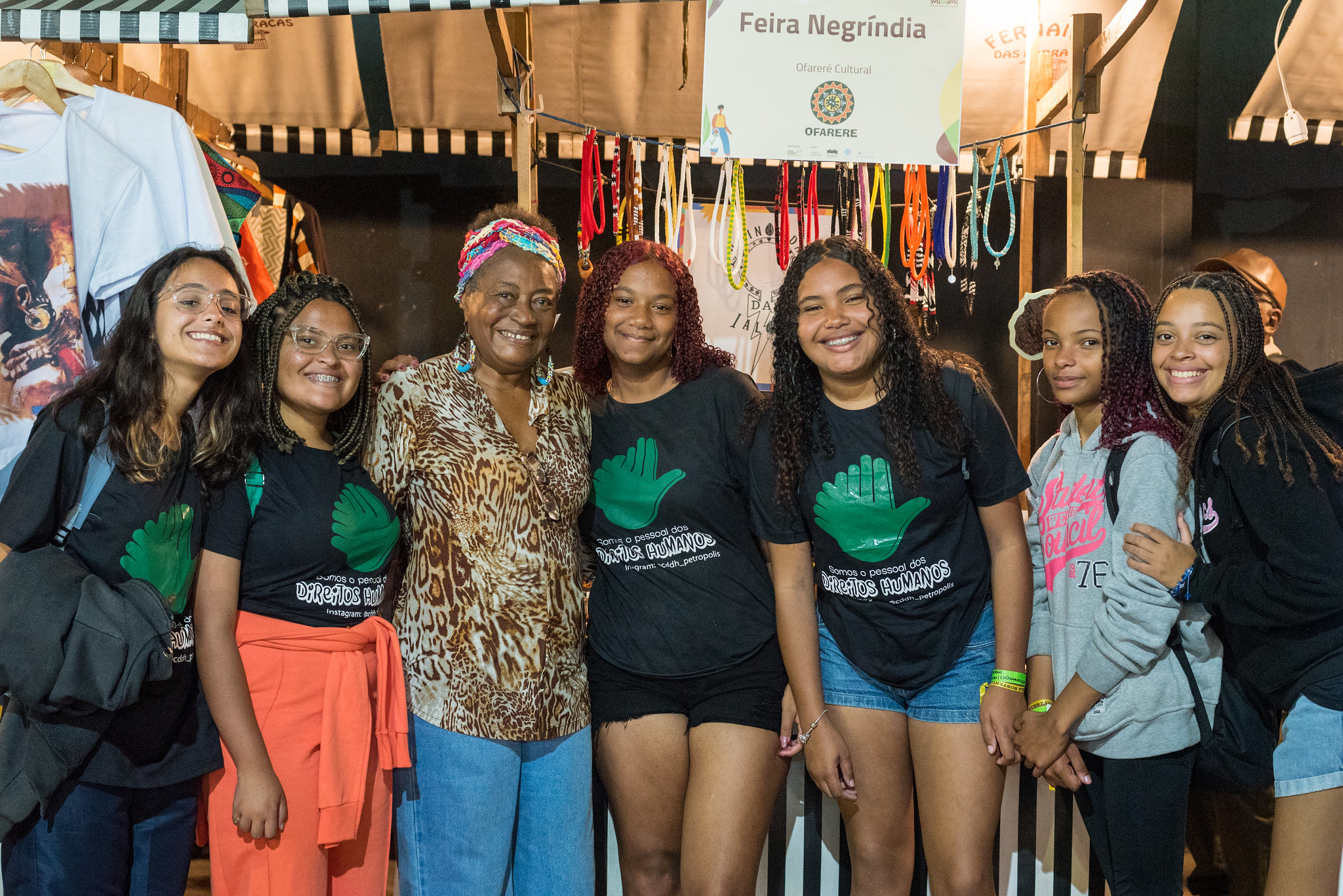
When asked to explain her work on empowerment, alongside the sales from her business, Dona Anailda’s response unfolded as a life story devoted to the struggles of the Black Movement.
“I was a model in the 1970s and, despite all the difficulties of that time, I ended up taking a different path: teaching… An Afro music group called Agbara Dudu emerged in Madureira. Only Black people attended their events. That’s where I started teaching and working on self-esteem, runway skills, photography, makeup, and teaching people to walk in high heels. This led me to explore other ways to help people appreciate their own hair. I was talking about self-esteem back in the 1970s, 80s, and 90s. We would visit favelas, go into public schools, and they would walk the runway… to show how beautiful we are.” — Anailda Charmite
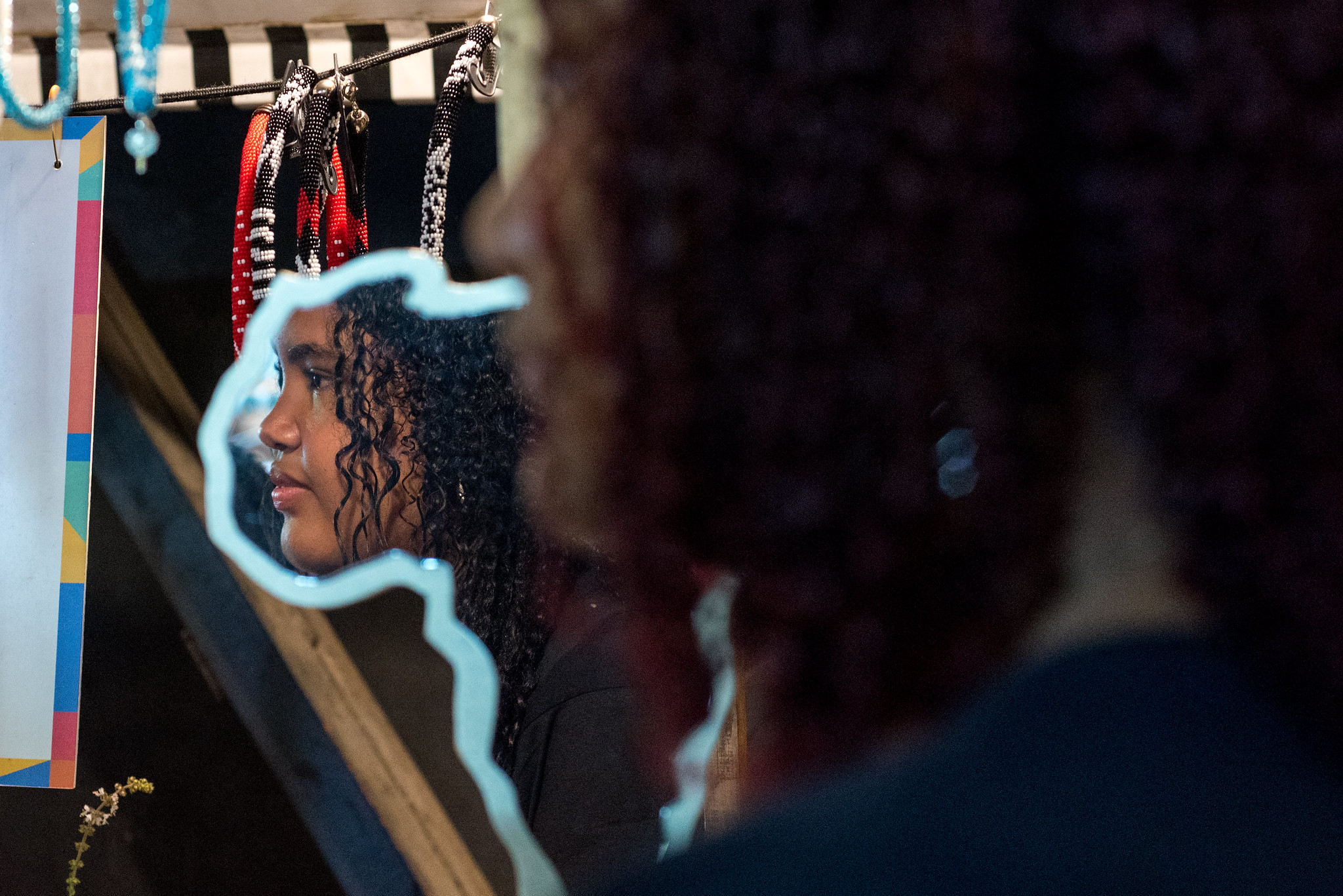
Another highlight at the market was the Salgueiro Herb Growers‘ space for donating medicinal herb seedlings.
Healing Spaces
One of the most sought-after spaces at the Sustainable Favela Festival focused on self-care and reflections on physical, emotional, and mental health. Various activities were held in the Healing Spaces, including: “Black Women’s Health Discussion Circle” (Abebé de Ouro Humanitarian Center – CHAO), “Favela Health Through an Anti-racist Perspective” (Unified Black Movement – Health), “Guidance on Healthy Eating” (Actions in Nutrition/Ramos), “Mental Health and Body Care Action” (Women’s Connection Social Center), and an activity on “Forest Bathing” (RJ Forest Bathing Collective).
In addition to the discussion circles, festival participants enjoyed spaces for relaxation and ancestral care featuring natural teas, massages, and poetry writing: Popular Health Practices (Casa Arte Cura e Agroecologia), Collective Care – Tension & Trauma Releasing Exercises (TRE) for Activists (Clara Simas Ferraz), Touch as a Healing Tool (Body Movement Therapy), Poetic Escrevivências [a method and term coined by writer Conceição Evaristo to narrate Black lived experiences in Brazil] (Environmental In-Put Collective), Spa: Medicinal Herb Care (Agroecological Providência), Native Therapies (Rochedo Puri Village/Genivaldo Nogueira Institute), AcuSphera Healing Therapy (Favela Museum/PPG), and Pranic Therapy (Favela Museum/PPG).
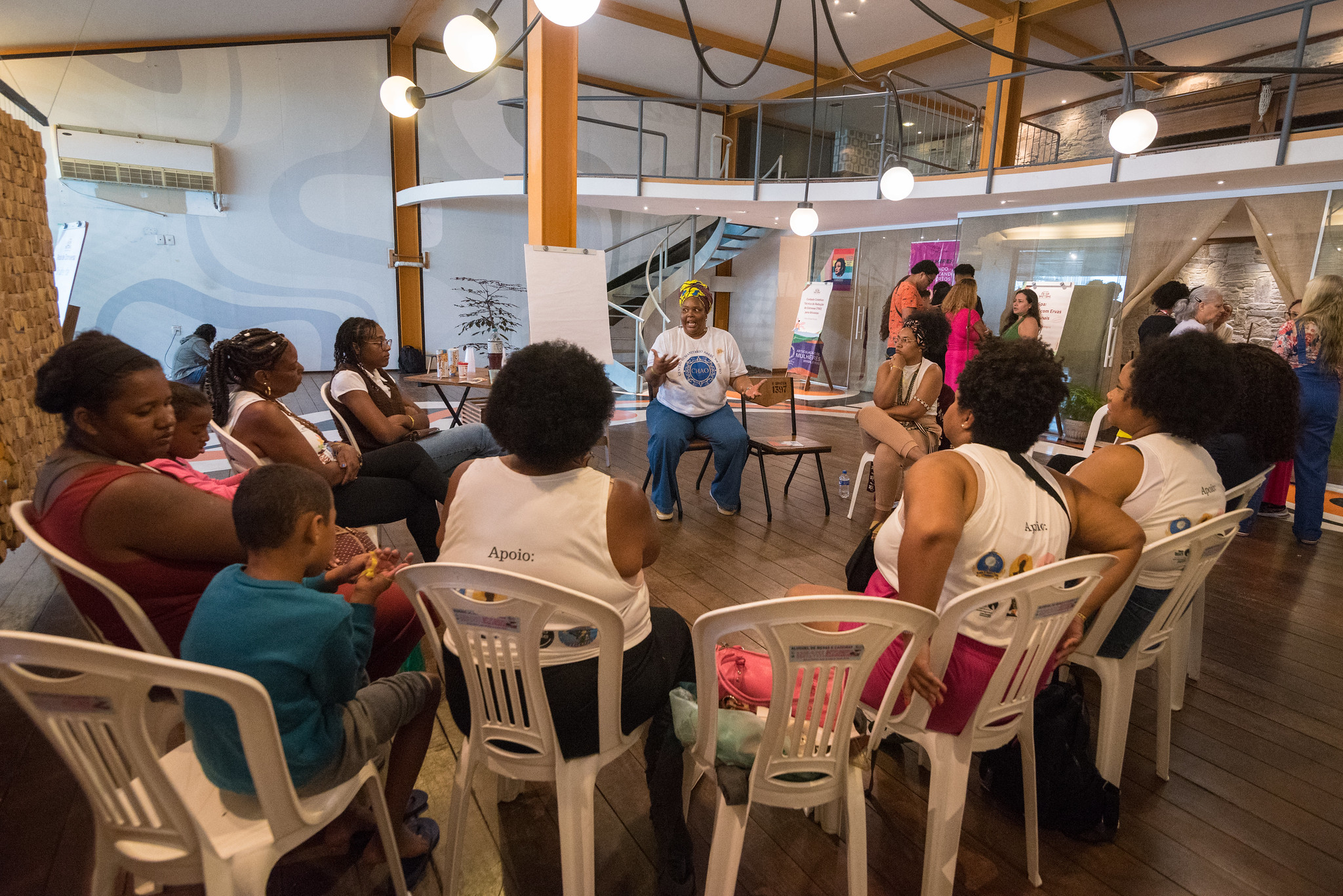
During the “Black Women’s Health Discussion Circle” (Abebé de Ouro Humanitarian Center-CHAO), Mother Jaci guided participants in a reflection that placed race at the center of the discussion. The group discussed Black women’s health, the burdens they bear, and the challenges of existence. Despite the emotional nature of the topic, Mother Jaci facilitated the circle with great care and sensitivity. At the end, she emphasized the significance of bringing her activity to the Festival.
“We brought a discussion on women’s health among mature Black women, to the Sustainable Favela Festival, addressing not just illness and access to public health services, but also the suffering caused by poverty and the losses we endure daily. We came here to talk about the importance of community in this woman’s life, because she cannot heal herself. This Festival is beautiful! It gave us a warm, welcoming space where we could gather and truly listen to one another. It is a space of healing and connection. I feel deeply moved. I have long awaited the day when we could step outside the terreiro [sacred space of Afro-Brazilian religious worship]! Our project comes from a Candomblé terreiro in Itaipuaçu, where I have served the community for five years. It is so meaningful for us to leave our community and share what we do with a wider audience. There are so many people who need to be heard, so many things that still need to be told. We don’t want to talk about pain anymore—we want to say that healing is possible. But healing is only possible when you are embraced by someone who truly understands what you are feeling. And that is exactly what today’s Festival is about.” — Mother Jaci
At the “Spa: Medicinal Herb Care” (Agroecological Providência), participants could enjoy teas made with medicinal and relaxing herbs, as well as indulge in a foot soak. Set in an intimate and welcoming space, the atmosphere was serene, and the soothing aromas were noticeable even to those approaching the room where the activity was held.
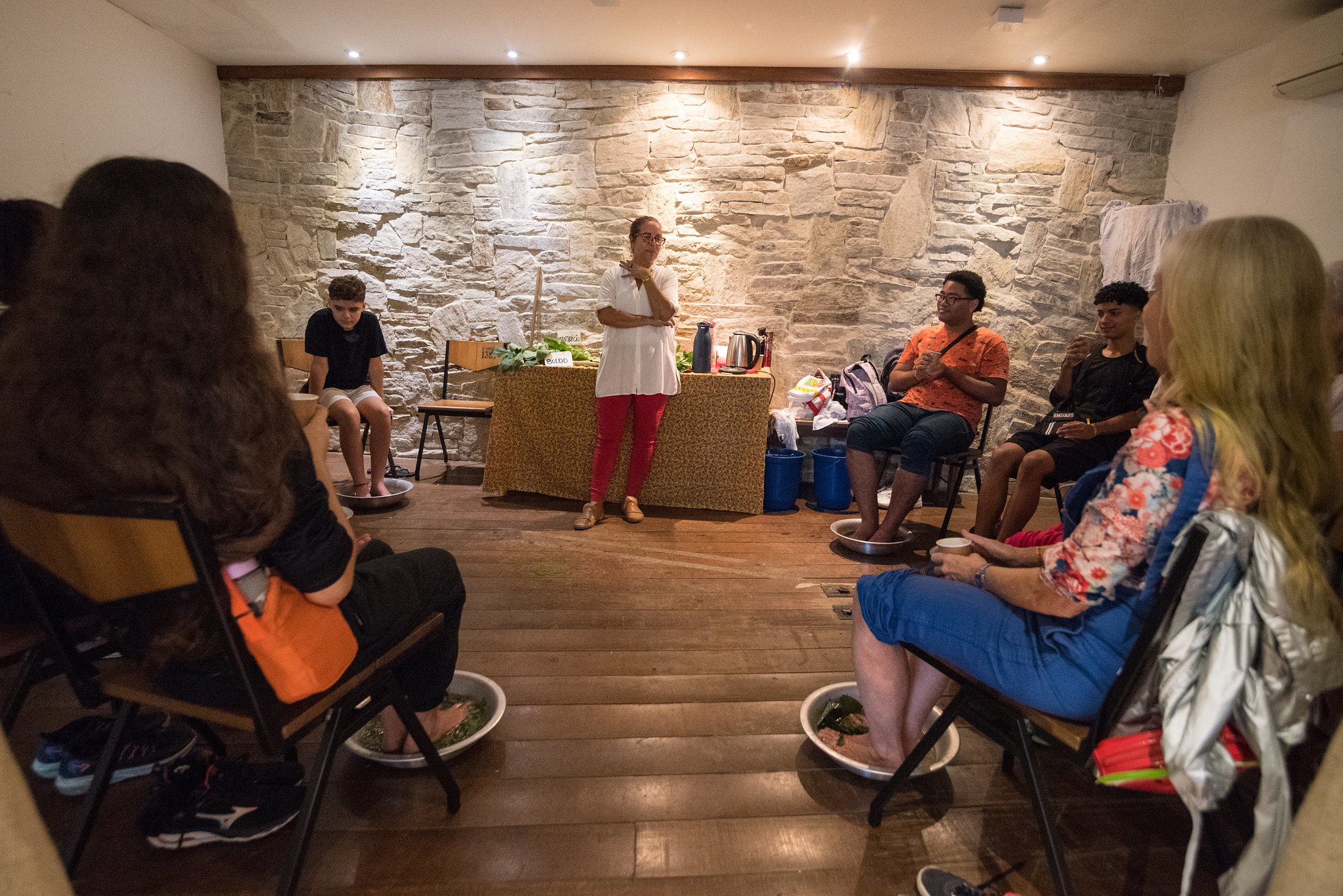
The “Poetic Escrevivências” workshop (Environmental In-Put Collective) promoted another type of therapy. Thoth Takita and his colleagues introduced poetry writing as a way to express and ease everyday emotions and struggles, while also encouraging writing as a means of documenting lived experiences.
“Each lived experience is unique and special. So, what is writing? It’s important [because] sometimes we carry unresolved challenges in our daily lives—things we don’t resolve with friends, spouses, or partners… And we hold it all inside. This needs to come out… Poetic writing helps release all that energy.” — Thoth Takita
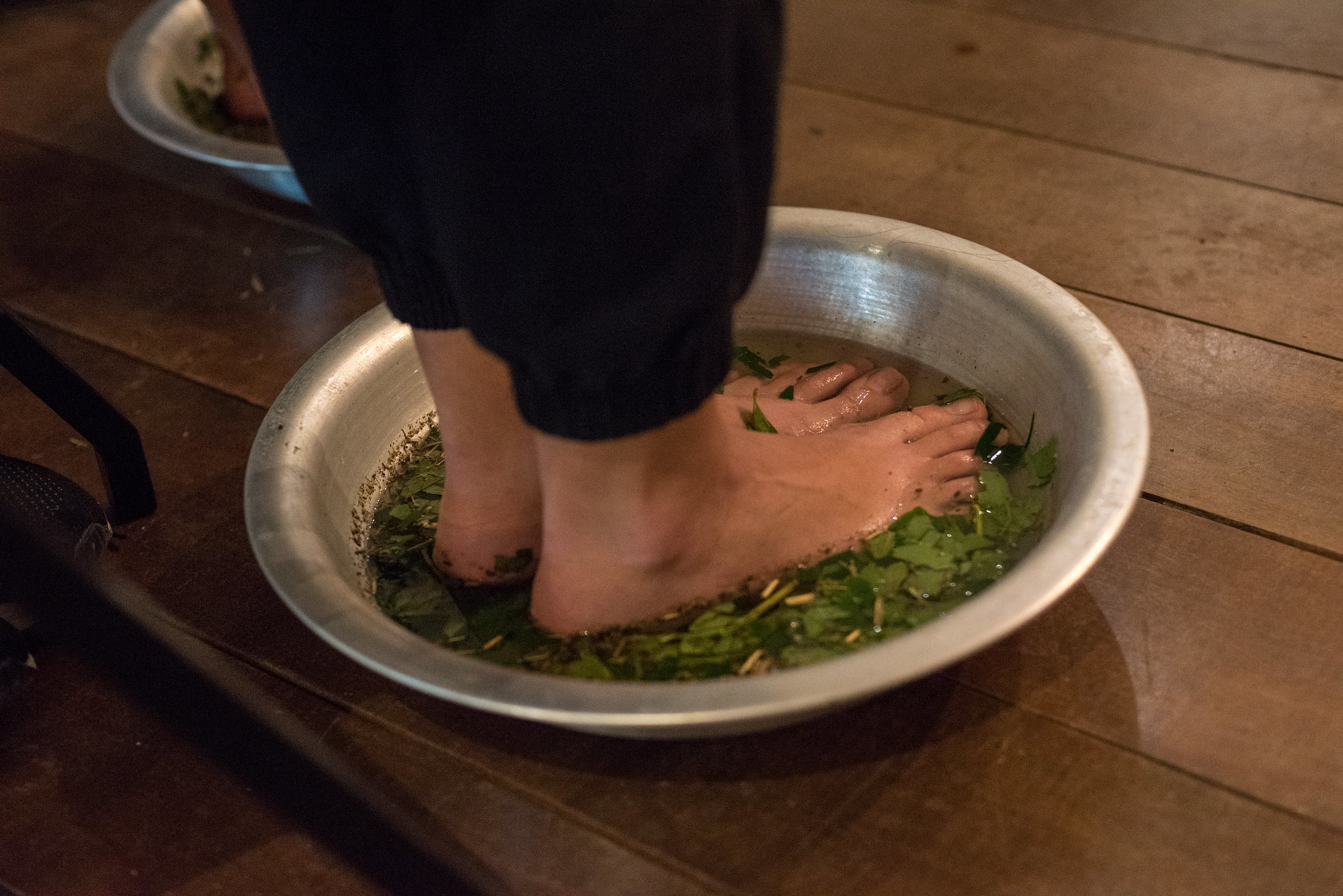
Film Club and Exhibitions
In the morning, the film club featured various activities, including “Audiovisual that Serves Society” (Literary Samba/São João de Meriti), as well as discussions and reflections about resistance in a sacrifice zone, with screenings of the films Fisherman’s Tales and Bay (Sepetiba Ecomuseum) and the short films Health from an Anti-Racist Perspective and Everyone Can Play (Solidary Manguinhos).
The afternoon featured a workshop led by researchers from favelas and peripheral areas (LEDUB/Complexo do Lins/Vidigal/Maré), a screening of the film We Held the Sky by Telling Stories by the Favela Film Club of Morro da Providência, and a workshop on creating research forms using Kobotoolbox, facilitated by the Decodifica Institute.
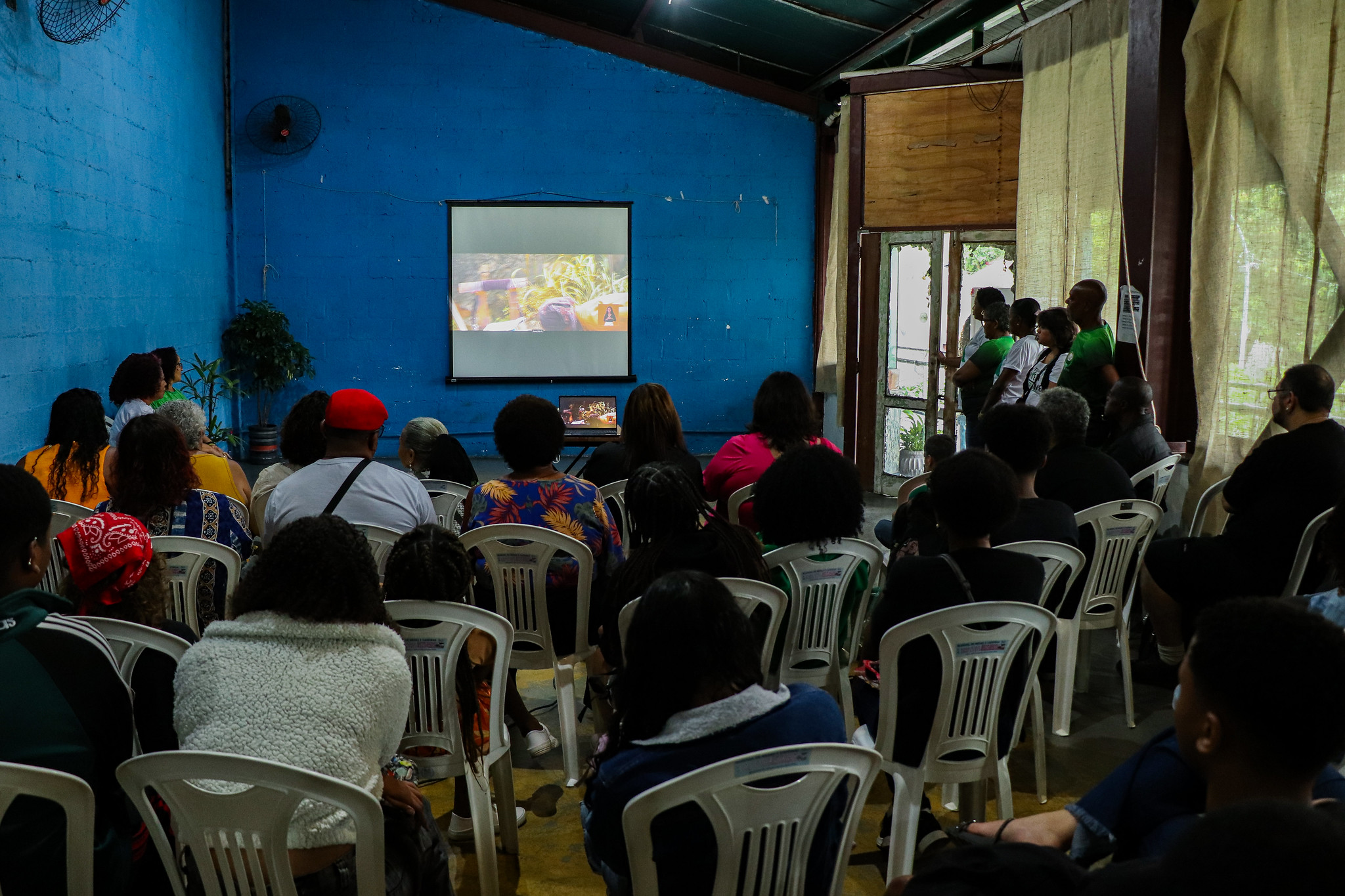
Among the exhibitions were: Favela Climate Memory; The History of Rivers and of Mata Machado: Unraveling the History of the Mata Machado Community (Young Favela Collective/Casa Favela); Memories of Cerro Corá (Cerro Corá Residents in Motion); Images of Memory and Struggle (Evictions Museum/Vila Autódromo); and Social Gardening for the Elderly: Food Security and Sustainability (Parque Horácio Cordeiro Franco Women’s Movement/Benfica).
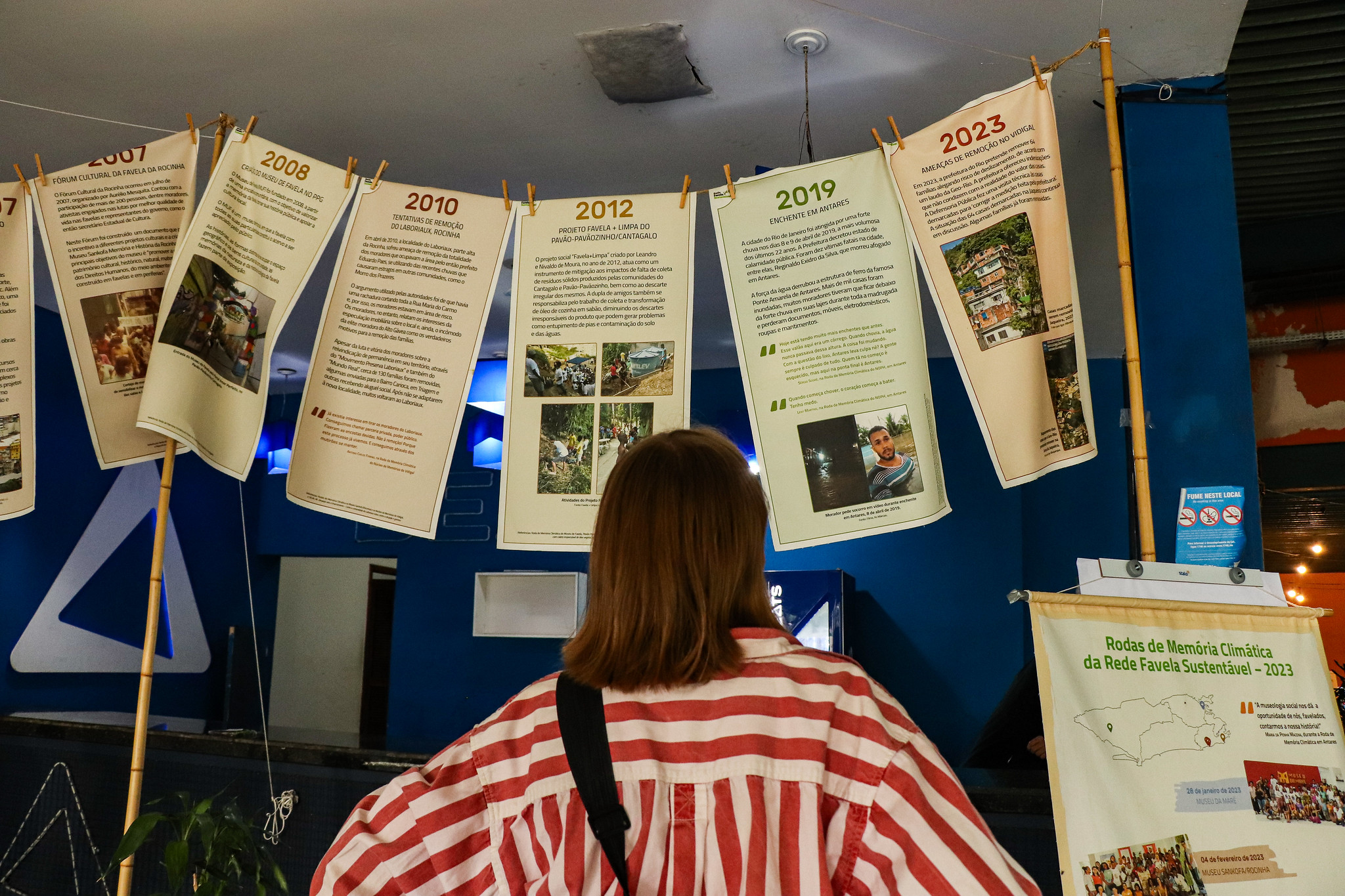
The inaugural Sustainable Favela Festival establishes itself as a sustainability event created by and for favelas, open to all. Through its presentation of innovative socio-environmental solutions during an intense day of activities, this festival positions favelas at the center of solutions to growing socio-environmental challenges, reaffirming their role as key agents in building a more sustainable and equitable future. In a space brimming with shared knowledge, the festival fostered an exchange of ideas and strengthened community bonds between favelas and also with other parts of the city. An event like this holds the power to transform not only these communities but society as a whole.
Save the date! The Sustainable Favela Network has announced the anticipated date for the 2nd Sustainable Favela Festival: October 18, 2025.
See the Official Photos from the 1st Sustainable Favela Festival on Flickr:
*The Sustainable Favela Network (SFN) and RioOnWatch are initiatives of the NGO Catalytic Communities (CatComm).
About the author: Bárbara Dias was born and raised in Bangu, in Rio’s West Zone. She has a degree in Biological Sciences, a master’s in Environmental Education, and has been a public school teacher since 2006. She is a photojournalist and also works with documentary photography. She is a popular communicator for Núcleo Piratininga de Comunicação (NPC) and co-founder of Coletivo Fotoguerrilha.

